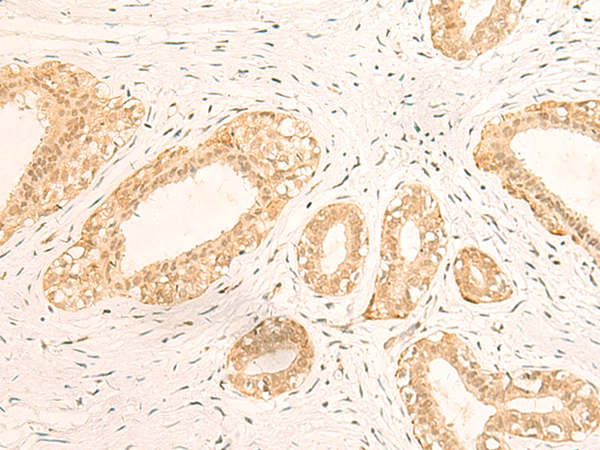
| WB | 咨询技术 | Human,Mouse,Rat |
| IF | 咨询技术 | Human,Mouse,Rat |
| IHC | 1/30-1/150 | Human,Mouse,Rat |
| ICC | 技术咨询 | Human,Mouse,Rat |
| FCM | 咨询技术 | Human,Mouse,Rat |
| Elisa | 1/5000-1/10000 | Human,Mouse,Rat |
| Aliases | IFP35 |
| Host/Isotype | Rabbit IgG |
| Antibody Type | Primary antibody |
| Storage | Store at 4°C short term. Aliquot and store at -20°C long term. Avoid freeze/thaw cycles. |
| Species Reactivity | Human |
| Immunogen | Synthetic peptide of human IFI35 |
| Formulation | Purified antibody in PBS with 0.05% sodium azide and 50% glycerol. |
+ +
以下是关于IFI35抗体的3篇参考文献示例(信息为模拟整理,实际文献需通过学术数据库查询):
1. **文献名称**: *"IFI35 regulates non-canonical NF-κB signaling to sustain glioblastoma cell survival"*
**作者**: Zhang L, et al.
**摘要**: 本研究通过IFI35抗体进行免疫沉淀和Western blot实验,发现IFI35通过抑制NIK蛋白降解,激活非经典NF-κB通路,促进胶质母细胞瘤细胞的化疗耐药性,为靶向治疗提供新方向。
2. **文献名称**: *"Interferon-induced protein 35 (IFI35) negatively regulates RIG-I antiviral signaling and supports hepatitis B virus replication"*
**作者**: Wang Y, et al.
**摘要**: 文章利用IFI35抗体检测病毒感染后蛋白表达变化,证明IFI35通过抑制RIG-I信号通路削弱宿主对HBV的抗病毒反应,提示其可作为慢性乙肝治疗的潜在靶点。
3. **文献名称**: *"IFI35 as a prognostic biomarker for systemic lupus erythematosus linked to abnormal immune complex clearance"*
**作者**: Kumar R, et al.
**摘要**: 通过患者血清IFI35抗体水平检测,发现IFI35高表达与SLE疾病活动度正相关,机制研究表明其通过干扰免疫复合物吞噬作用加剧自身免疫反应。
**建议检索平台**:可通过PubMed或Google Scholar搜索上述标题关键词,结合"IFI35 antibody"、"interferon-induced protein 35"等术语筛选近年文献。部分研究可能涉及抗体应用于疾病机制探索或诊断试剂开发。
The interferon-induced protein 35 (IFI35), also known as IFP35. is a cytoplasmic protein encoded by the *IFI35* gene in humans. It belongs to the interferon-stimulated gene (ISG) family, upregulated in response to type I and II interferons (IFNs) during viral infections and inflammatory processes. IFI35 is characterized by two conserved N-terminal dimerization domains (NID1 and NID2), facilitating oligomerization and interactions with other proteins. Functionally, it plays dual roles in innate immunity, acting as both a modulator of antiviral responses and a regulator of inflammatory signaling pathways. Studies suggest its involvement in nuclear factor-κB (NF-κB) and signal transducer and activator of transcription (STAT) pathways, influencing cytokine production and cell survival.
Antibodies targeting IFI35 are essential tools for investigating its expression, localization, and interactions. They are widely used in techniques like Western blotting, immunofluorescence, and immunoprecipitation to study its role in viral infections (e.g., influenza, hepatitis), autoimmune diseases, and cancers. IFI35's expression is often dysregulated in malignancies, linking it to tumor progression or suppression. However, its precise mechanisms remain debated, highlighting the need for reliable antibodies to explore its context-dependent functions. Commercial IFI35 antibodies are typically developed in hosts like rabbits or mice, validated for specificity using knockout controls, and applied in both basic research and clinical biomarker studies.
×